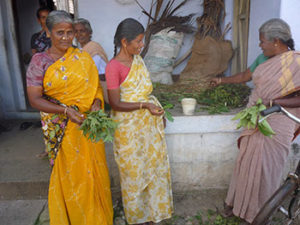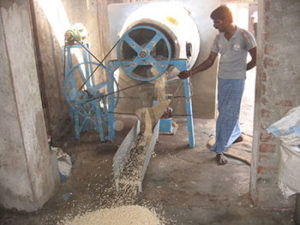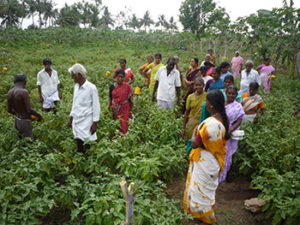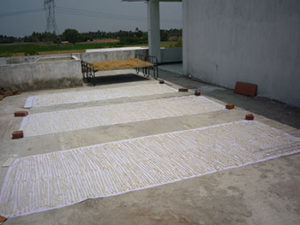INTRODUCTION
This project is being implemented in Kancheepuram, Thiruvannamalai, Dindigul and Ramanathapuram districts with support from UNDP-GEF from November 2008 onwards.
OBJECTIVES
- To link biodiversity conservation with marketing.
- Conserve indigenous varieties of seeds in the tsunami-prone coastal district of Nagapattinam through communities.
- Reduce POPs in vegetable cultivation by conserving indigenous vegetables and organic farming.

Practical session on biopesticide preparation
ACTIVITIES DONE UNDER THE PROJECT
- Seven value-added products like rice appalam, vadaam, puttu mix, rice vermicelli etc., were standardized.
- Members of 58 Self Help Groups (SHGs) were trained on value addition.
Two women SHGs in Nagapattinam district are involved in the commercial production and marketing of value-added products. - A 225 square-foot-structure has been constructed for the preparation of value-added products in Kancheepuram district.

A Puffed rice unit visited at Polur
- More than 25 traditional paddy varieties are being conserved in the coastal villages of Nagapattinam district.
- Eleven types of five indigenous vegetable varieties are being conserved in Dindigul and Nagapattinam districts.
- Training programmes on POP reduction and organic farming technologies were conducted for the beneficiaries. Both theory and practical sessions were conducted. Three exposure visits were organized for the beneficiaries of Dindigul district. They were exposed to various organic farming technologies.

Exposure visit to an organic farm
- Forty-five villages in the Nagapattinam district were surveyed for indigenous varieties. Two NGOs conserving indigenous varieties were also visited and links established. Characteristics of the varieties were documented.
- Survey on traditional vegetable varieties was conducted in Dindigul district. 11 varieties of 5 types of vegetables have been identified. Farmers were involved in the cultivation and conservation of the seeds using the indigenous vegetable seeds provided.
- In Dindigul district, for POP reduction – survey on the cost of cultivation for tomato, brinjal and bhendi in both organic and conventional method of farming was conducted.
- Case studies on the cultivation of traditional paddy varieties were conducted.
Intensive trainings on the reduction of POPs (Persistent Organic Pollutants), organic farming and related technologies were conducted for the beneficiaries. - Capacity building trainings were conducted for the farmers and representatives of other NGOs.
- Informative calendars on “Rice biodiversity” and “Organic farming technologies” were brought out.

Value added product – Vada
